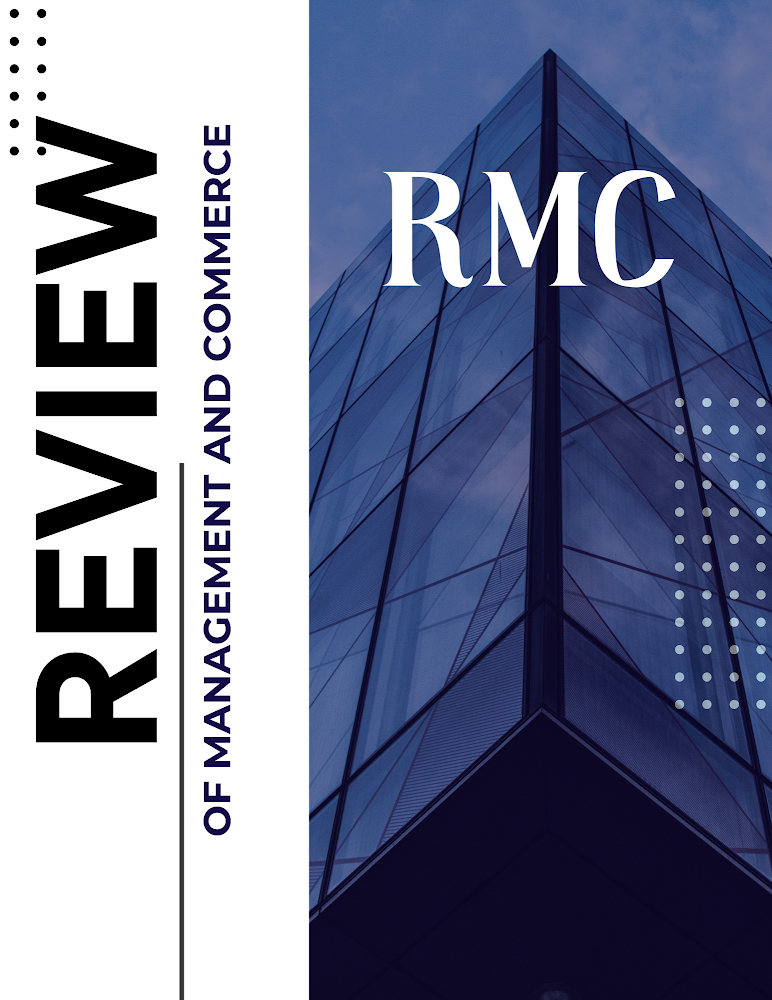Ethics policy
Publication Ethics and Malpractice Statement
Malpractice Statement
Review of Management and Commerce (RMC) is committed to preserving the dignity of ethical practices in the field of academics and the accuracy of the records. While RMC is not a member of the Committee on Publication Ethics (COPE), the journal abides by all the guidelines stated in the COPE Code of Conduct.
Publication and Authorship
Originality: The journal solely focuses on publishing research papers that have not been published in other journals before. When submitting manuscript, authors certify that is a unique work done by them and assume all the liability for work’s scientific and ethical quality.
Exclusivity: It is the responsibility of the author to make sure that the work in the manuscript has not been published of under consideration for publication elsewhere.
Authors' Responsibilities
Authenticity: Authors are required to publish findings of quality and original research and this will have to be supported with adequate information to help replicate results.
Data Retention: Raw data should be kept by authors and provided as soon as the editor so asks.
Acknowledgment: Every piece of information that has been used in a paper or any outside information that may have influenced the paper in one way or another must be properly referenced.
Authorship: Authorship should represent those who contributed towards the generation of ideas for the research. The corresponding author has to bear responsibility and guarantee the consent of all other co-authors to the last version of the manuscript.
Conflict of Interest: More so, authors should declare their affiliations to any conflict of interest in their work.
Peer Review Participation: Editors are compelled to take part in peer review of papers by authors.
Error Correction: Manuscript authors have to inform the journal editor of all major errors they find in the published paper and contribute to their correction.
Reviewers' Responsibilities
Confidentiality: Manuscripts should be regarded as the documents and should be treated accordingly.
Expertise and Timeliness: Before undertaking the task of reviewing the manuscripts, the reviewers should only accept to work on manuscripts, which fall within their areas of specialty and within the recommended time.
Objectivity: Reviews should be professional and not a result of the author’s own bias and prejudice.
Acknowledgment of Sources: The reviewers should look for the published work which the authors did not include in their research papers.
Conflict of Interest: Reviewers should declare any such interest to the management and step down if the situation warrants it.
Ethical Concerns: Reviewers also have the responsibility to inform the journal editor if there is any ethical problem and irregularity or even suspected misconduct.
Editor's Responsibilities
- The editor ensures the confidentiality of the submitted manuscripts.
- Manuscripts are initially evaluated by the editor for the originality before being sent for double-blind peer review.
- Acceptance or rejection decisions are based on the manuscript’s importance, originality, clarity, and the relevance.
- The editor evaluates the manuscripts on the bases of their intellectual content without regard to the authors’ personal characteristics.
- The editor is committed to publishing corrections, clarifications, retractions, and the apologies when necessary.
- The editor will act on any suspected misconduct by ensuring proper investigation and appropriate action.
- Editorial decisions are made without any interference from the publisher and based on ethical standards.
Publishing Ethics Issues
- The editorial board is responsible for maintaining the journal's ethical standards and preventing the publication malpractice.
- The editor and editorial board ensure the integrity of the academic record and do not tolerate the plagiarism or fraudulent data.
- The editor ensures corrections and retractions are made as needed, in accordance with COPE guidelines.
- The editor cooperates with the institutions investigating research misconduct, providing necessary evidence and support.
- Publications may be retracted for reasons including unreliable findings, redundant publication, plagiarism, or unethical research. Retractions will be clearly identified.
By adhering to these ethical guidelines, Review of Management and Commerce (RMC) aims to uphold the highest standards in scholarly publishing, ensuring transparency, integrity, and respect within the academic community.


